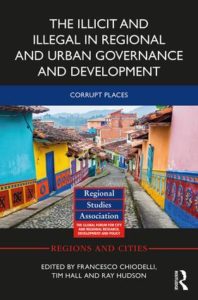Recognising that definitions of the illicit vary over time, space and cultures, there has long been strong evidence that a range of illicit actors, including, but not restricted to, those engaged in organised criminal activity, have been involved in the processes and institutions of regional governance and development across a diverse, international terrain. This has involved the generation of economic revenues from activities such as narcotics production and trafficking, which can be significant regionally and nationally in the context of poverty and a lack of legitimate economic alternatives; social governance through fear, the threat of violence and normative influence over regional cultural spheres and political governance through the development of symbiotic relations with the state at a regional level, corruption and the capture of the state. Typically these illicit actors are portrayed as predatory, although there is evidence that they can perform important governance and development functions in some circumstances.
These discussions have tended to be somewhat restricted in their disciplinary range, to date, and have been largely confined to the literatures of anthropology, criminology, policing and, to an extent, political science. Both network organisers have sought to open up these debates through recent interventions in the geographical literature (Hall, 2013; Hudson, 2013). However, these debates have impinged little on cognate literatures, not least those of regional studies which remain almost entirely undisturbed by such issues. This RSA research network aims of open up debates in regional studies to the questions posed by the involvement of illicit actors in regional governance and development. In doing so it aims to extend the range of debates in regional studies empirically but also question conceptually the, to-date dominant, discussions of regional governance and development that have been rooted largely or entirely in the realm of licit actors. The research network will aim to open up multidisciplinary dialogues involving both practitioners and academics, which critically interrogate both empirical and theoretical material. The network’s dialogues will be organised around the following themes:
• Exploring the extent of illicit regional governance and development across international space;
• The nature and diversity of illicit regional governance and development across international space;
• Implications for regional policy and research.
The organisers of this Research Network have published a book as the outcome of this network: The Illicit and Illegal in Regional and Urban Governance and Development.
The Illicit and Illegal in Regional and Urban Governance and Development is a multidisciplinary volume that aims to open up these debates, extending themempirically and questioning the dominant discussions of governance and developmentthat have been rooted largely or entirely in the realm of licit and legalactors. The book investigates these issues with reference to a variety of differentgeographical contexts, including, but not limited to, places traditionally consideredto be associated with illegal activities and extensive illicit markets, such assome regions in the so-called Global South. The chapters consider the ways inwhich these questions deeply affect the daily lives of several cities and regions insome advanced countries. Their comparative perspectives will demonstrate thatthe illicit and the illegal are an underappreciated structural aspect of current urbanand regional governance and development across the globe.
The book is an edited collection of research-informed essays, which will primarily be of interest to those taking advanced undergraduate and taught postgraduate courses in human geography, urban and regional planning and a range of social science disciplines that have an interest in urban and regional issues and issues related to crime and corruption.
